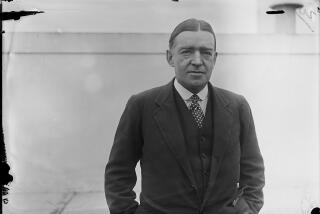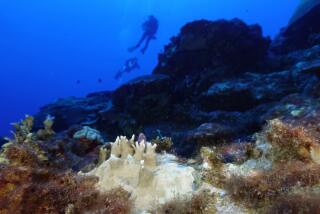Chaos Threatens ‘Judicial No-Man’s Land’ of Antarctica
PALMER STATION, Antarctica — Like a monument to the end of Antarctica’s age of innocence, the Bahia Paraiso’s badly gashed orange hull rises out of ice-blue waters.
Penguins calmly perch atop the overturned vessel, unaware of the danger in the thin oily sheen on the water around them. Most of the tens of thousands of gallons of diesel fuel that spilled out in the shipwreck Jan. 28 has since evaporated, but more is slowly leaking.
Times are changing at Earth’s last frontier.
Countries eager to stake or reinforce their claims to a slice of the Frozen Continent are dispatching ships and aircraft, bulldozers and amphibious trucks. With nationalistic fanfare, they are building new bases and launching new research projects.
During the austral summer, well-heeled tourists arrive by the hundreds each week on cruise ships, supply vessels or military transport planes contracted by specialized travel agencies. Even private yachts and polar skiing expeditions are venturing into the last place on Earth where no passport is needed.
Accidents are happening, and in the case of the Bahia Paraiso, Antarctic wildlife paid the price. A host of legal, environmental and highly political questions are surging up like the hazardous icebergs in Antarctica’s poorly charted seas.
“You’re confronted daily with an ever-hastening chain of events,” Peter Wilkniss, polar programs chief for the Washington-based National Science Foundation, told a visiting Associated Press correspondent at Palmer Station. The foundation directs all U.S. research in Antarctica.
Wilkniss advocates increased international regulation.
“There’s nothing that prevents anyone from doing anything they want,” he said. “I don’t think we can live with that situation.”
He described the continent’s 5.1 million square miles as “a judicial no-man’s land.”
No laws apply to Antarctica because no one owns it, according to the terms of the Antarctic Treaty. The pact was signed in 1961 by 12 countries who agreed to put all territorial claims on hold for at least 30 years and reserve Antarctica for peaceful research.
Eight other nations since have joined the treaty with full voting powers, while an additional 18 have agreed to abide by its provisions and hold observer status. The treaty nations meet about every two years.
The organization recently drafted a plan to permit strictly regulated exploration and exploitation of the continent’s mineral resources after 1991, when the treaty itself is up for review.
But it is only beginning to grapple with such issues as the proliferation of bases, marine and air safety, indemnification, and medical and rescue facilities.
The wreck of the Bahia Paraiso exemplifies the region’s predicament.
The 435-foot supply and research vessel, operated by the Argentine navy, called on Palmer Station in glacier-rimmed Arthur Bay on Jan. 28 so the 81 tourists on board could take a look around. It also carried a crew of 235.
On its way out of the bay, it ran aground in a passage marked on sea charts as containing “dangerous ledges and pinnacles.” Crew and passengers got off safely in lifeboats and found shelter at the station.
The ship, over a period of four days, gradually rolled over and sank. About 180,000 gallons of diesel oil from its storage tanks spilled into the water.
Station workers said only fair weather prevented a disaster. They said most of the Bahia Paraiso’s lifeboats were open, inflatable rafts without oars or motors. The day was calm and they could be towed ashore by station work boats without difficulty. But they could have overturned or been blown out to sea if the volatile Antarctic weather had taken a turn for the worse, the workers said.
In response to the diesel spill, the National Science Foundation dispatched navy and civilian pollution control experts with 52 tons of specialized equipment. The mission cost more than $2 million. The Chilean and Argentine navies also sent costly cleanup missions.
The cleanup ended in mid-March, although the Bahia Paraiso still holds about 63,000 gallons that cannot be safely reached and pumped out. It could spill if the ship breaks up in a winter storm or simply seep out for many months as the wreck gradually disintegrates. Experts say it would be too costly to haul the wreck away.
The area of the spill teems with wildlife, including penguins, skuas, cormorants, Arctic terns and other birds. Seals and whales frequently pass through the bay.
Scientists say there is indirect evidence that many penguins and other birds were poisoned by the spill, but they have been unable to determine the extent of the damage. A team of 15 researchers from the United States, Argentina and Chile has arrived to begin a comprehensive study on the spill’s environmental impact. It will take years to complete.
But there is no way a claim for damages can be made. Since the United States has no property rights to the area at or around Palmer Station, it has no legal grounds for seeking compensation. The area of the accident, on the Antarctic Peninsula, is claimed by Chile, Argentina and Great Britain.
Chile recently announced plans to propose, at the next Antarctic Treaty meeting in Paris in October, an article to hold each country financially responsible for environmental or other damage. The Science Foundation plans to press for agreement on cost-sharing in cleanup of spills and other accidents, and for formation of an international coordinating office for emergencies.
But there could be some opposition.
“We must act with prudence, without falling into decisions that could be a little hasty,” said Roberto Daverede, head of Antarctic affairs for the Argentine Foreign Ministry. Argentina claims a thick wedge of the continent and, like the other claimant nations, rejects any foreign or international jurisdiction.
Daverede played down the effects of the Bahia Paraiso spill.
“This is far from being a natural catastrophe,” he said. He called the wreck “an isolated incident.”
Nonetheless, less than a month after the Bahia Paraiso accident a Peruvian research ship ran aground 300 miles away, near King George Island. The vessel, called the Humboldt and touted as the flagship of Peru’s territorial claim, also spilled some diesel fuel but was soon refloated.
By world standards neither accident would qualify as a major environmental disaster.
“I’ve walked away from bigger diesel spills than this where nothing died, absolutely nothing,” said Jim O’Brien of Gretna, La., a pollution control expert hired by the U.S. government for the Bahia Paraiso cleanup.
Uncontrolled Tourism
But there is special concern that Antarctica’s environment may be especially fragile. There is also a growing belief that its huge cold mass plays a key role in long-term global weather patterns.
During the austral summer, more than 30 cruises are scheduled to call on Palmer, bringing an average 100 tourists each.
Tourism is uncontrolled and, to some, out of control.
“In 1982, we got three cruise ships all season,” said Bruce Carter of ITT-Antarctic Services, which is contracted to supply and maintain Palmer Station. “This year we got as many as five a week. We’d sometimes get two in one day.”
The station’s staff includes a medical corpsman who works in a one-room clinic available for treating the few dozen people at the base. It is not designed for handling a maritime disaster.
The Science Foundation briefly tried to ban tourist visits last year, arguing that it interfered with research. But the ban was lifted when influential Americans complained, claiming a right to see how their tax dollars are being spent. The Bahia Paraiso’s tourists included 46 Americans who paid from $3,000 to nearly $7,000 for the cruise.
Spirit of Cooperation
There are some indications that the strain on the local environment may be straining political relations.
For decades, a unique spirit of international friendship and cooperation has reigned in Antarctica. Political conflicts were left at the doorstep, and missions from such ideoalogically distinct countries as the Soviet Union and right-wing Chile lived as next-door neighbors, sharing supplies, equipment and a drink or two on the cold nights.
In early March, however, the Chileans criticized what they called the poor waste handling at the Soviet Bellinghousen base, literally a stone’s throw from their own Marsh base on King George Island. They said they would file a complaint at the next treaty meeting.
More to Read
Sign up for Essential California
The most important California stories and recommendations in your inbox every morning.
You may occasionally receive promotional content from the Los Angeles Times.










